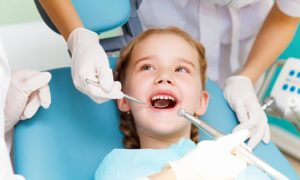This is a common question we hear daily in our practices. There is a general recommendation by the American Association of Orthodontists to have your child seen by an orthodontist by age 7.
While the majority of children at this age do not need any Orthodontic treatment, there is a significant percentage that does need “early interceptive orthodontic treatment.”
The key word here is “interceptive,” meaning that orthodontic treatment at this early age is intercepting a problem that left untreated would require more extensive treatment later or not be able to be treated with orthodontics alone. By correcting a problem early, you can avoid more extensive treatment later which may include extractions and possible jaw surgery.
The majority of the problems that are treated early are due to a “growth problem.” The upper and lower jaws are not growing at the same rate or in the same direction, or one is too small or one is larger than the other. These types of problems are the reason we treat children as early as age 7.
Here is an overview of the problems that would be best corrected early (before all the adult teeth are in place.)
- Severe crowding of the teeth. Your child has lost some baby teeth and the adult teeth that are coming in are sideways, up to high, behind other teeth or maybe not coming in at all. Instead of removing baby and adult teeth, your child can have early treatment that will make room for all the adult teeth and therefore save them from any extractions of baby and adult teeth.
- A crossbite. This is when the lower jaw shifts to one side. You may notice that your child chews funny or that when they are biting down their face appears slightly off center. A crossbite is usually a problem with the growth of the upper jaw and is best corrected before age 10.
- An underbite. The lower jaw bites in front of the upper jaw. This type of bite problem is caused by a growth problem in the upper jaw and is best corrected during a child’s active growth phase. This type of problem in particular, if not treated early will often result in jaw surgery as a young adult.
- A thumb or finger sucking habit, severe tongue thrust or other oral habits. Most children who suck their thumbs and/or fingers for a prolonged period of time will cause some deformation of the shape of the upper jaw. This alteration in the shape of the upper jaw can cause crowding problems, airway problems, and bite problems. A simple, fixed appliance is generally used to correct this persistent habit.
- Severe mouthbreathing, grinding of the teeth, or airway issues. All these are related to your child’s jaw growth and development. Again a growth problem that is best corrected early while your child is still growing.
- Severe overbites. Depending on the severity of your child’s overbite, this can be corrected early with the use of removable retainers. With excellent cooperation, these removable retainers will often eliminate the need for more extensive orthodontic work later.
If your child has any of the above problems, you do not need a referral from your family dentist. You can call an Orthodontist directly and make an appointment for a consultation. Even if you are not sure, a consultation with an Orthodontic Specialist will give you an overview of your child’s current growth and development and give you valuable insight into any future orthodontic needs that your child may have.







